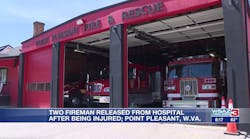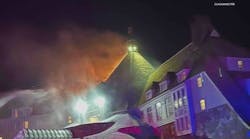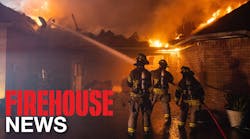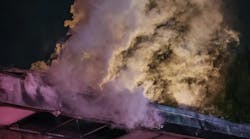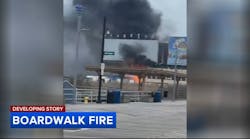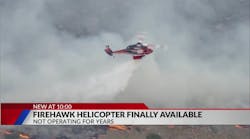Many times in the past, I have written about the need for our leaders to have a vision for the future. Far too many among us simply sit back and allow the wave of changes within the world to wash over them. I am not sure whether this sort of behavior arises out of ignorance or laziness. Regardless of which it is, the results are not good.
The wise leader steps forward and grabs the bull of changes by the horns and works to wrestle it to the ground. It is my belief that leaders would do more if they were better equipped to handle the challenge of the future. Let me offer a concept that each of you can use to help you prepare your goals for marching off smartly toward the future.
My research has identified one serious concept that deserves mention here. It's the word SMART. This is an acronym for the development of effective goals. I think that they should be both SMART and challenging. SMART stands for:
S -- Specific
M -- Measurable
A -- Achievable
R -- Resources
T -- Time limit
SMART does not really mean challenging, though it is my belief that a goal is not much good if it is easy to accomplish and is not challenging. Goals should be realistic, challenging and measurable, and they should be communicated. I see goals as being the guideposts on a map to the future.
Far too many among us do not take the time to lay out goals. Far too many take great pride in what they claim to be their ability to operate "on the fly." They believe that they have a mystical ability to do the right thing at the right time. To these people I state quite simply, it does not work like you think does.
Those people who have developed a proven ability to operate well under pressure and think on their feet also know the rules and regulations under which they operate. They are well aware of the parameters of their position and work to drill and prepare everyone in your organization to perform well in the jobs they will need to do when things start to go wrong.
As I stated above, you should work to develop goals that address specific issues. Wise leaders do not create overall goals wherein they state that they are going to work to make everything better or make everything safer. Not only are such goals not specific, but they also elude our collective ability to measure them. Let me urge you to create goals for each aspect of your organization. Do not lump things together. Leave nothing off the table and leave nothing to chance.
One of the keys to creating goals for an organization involves the development of an organizational framework that strongly supports your current operations. When the current operation is operating in an effective and efficient manner, it can serve as a solid springboard from which to move forward and develop your goals for the future of operations within your agency.
One of the best ways to accomplish this goal of standardization is to ensure that your firefighters have full knowledge of the standard operational procedures (SOPs) or general operating guidelines (GOGs). These SOPs and GOGs need to be realistic, easily understood and yet challenging. These guidelines and procedures need to be developed in concert with the members of the organization. They must not be created in a vacuum. Once these guidelines are created, they must be communicated to all members of the department. However, the requirement that the goals be measurable is not fully satisfied in the sense that its achievement cannot always be determined. Think of how difficult it is to determine when firefighters have "full" knowledge of anything. This is an area where success is found only when everyone in the agency gets a grade of 100% on the test.
Unless the leader allows for the development of goals that have a factor of measurement within them, they cannot be considered achievable. Let me offer the following goals for your consideration:
- We will operate our suppression units in a more effective manner.
- We will operate our EMS units in a more efficient manner.
Now, let me the offer the following goals for you:
- Our engine companies will seek to arrive on location at the scene of fire emergencies within five minutes for 95% of our incidents.
- We will work to double the number of fire department training opportunities for our EMS personnel within the next 24 months.
Do you see the difference? The first two are very touchy-feeling in nature and they sound good. But how do you accomplish them and how do you measure them? The second two goals are very specific and can be measured. You count the numbers at the beginning of the year and you count the numbers at the end of the year. You can then assess the relative success or failure of your efforts. This assessment will then allow you to modify your goals for the future. It is this assessment and modification process that allows you to move toward the future in an organized manner.
The second two goals also refer to the resources which will be involved within the goal-achievement process. The first refers to engine companies and the second refers to the use of EMS personnel. You may also wish to create maintenance-related goals that involve the various types of equipment in your fleet and your projected preventive maintenance requirements for them.
Let me suggest that it is even possible to set length-of-service goals for your fleet that include a maintenance schedule including daily, weekly, monthly and annual requirements for inspection and servicing. If your goal is to lengthen the service life of your resources, you need to create goals that are specific, measurable, achievable, resource-oriented, and time specific.
Why do I stress the need to set time limits for you and your goals? The reason is really quite simple and logical if you stop and think about it. If you do not set these time limits, you will never have a reason to work hard to reach them. They will lie out in front of you forever and a day. Some may serve to trap you in years to come. They will sneak up and bite you on the butt, usually when no one is looking.
Let me close with a simple thought: The future will come. It will come whether you want it to or not. You can reach out and work to meet it or you can end up being blown about by the winds of change: much a fallen leaf in late November. The wise leader looks out from the bridge of the ship and looks toward the horizon. They work to chart a course through the rocks and shoals which stand between all of us and the future. They realize the need to set goals. So too should you. Just make them SMART.
DR. HARRY R. CARTER, Ph.D., CFO, MIFireE, is a Firehouse® contributing editor. A municipal fire protection consultant based in Adelphia, NJ, he is the former president of the International Society of Fire Service Instructors. Dr. Carter is a past chief and active life member of the Adelphia Fire Company. Currently chairman of the Board of Fire Commissioners for Howell Township District 2, he retired from the Newark, NJ, Fire Department in 1999 as a battalion commander. He also served as chief of training and commander of the Hazardous Materials Response Team. Dr. Carter is vice president of the American Branch of the Institution of Fire Engineers (MIFireE). He recently published Living My Dream: Dr. Harry Carter's 2006 FIRE Act Road Trip, which was also the subject of a Firehouse.com blog. He may be contacted at [email protected].
